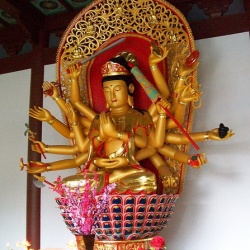Lokakṣema
Lokakṣema (支婁迦讖 or 支讖, 147–?) was from Gandhāra, an ancient Indian kingdom in present-day Kashmir, northern Pakistan, and eastern Afghanistan area. He was given the surname Zhi in Chinese, because he was a descendant of the Kushan (貴霜) tribe of Yuezhi ethnicity (月氏). He went to Luoyang (洛陽), China’s capital, in 167, the last year of Emperor Huan (漢桓帝) of the Eastern Han Dynasty (25–220). During the last eleven years (178–89) of Emperor Ling (漢靈帝), he translated over twenty sūtras, of which twelve are extant.
Lokakṣema was the first Indian Monk who went to China to propagate Mahāyāna teachings. Among the texts he translated from Sanskrit into Chinese, the Sūtra of the Practice of Prajñā-pāramitā (T08n0224) was the first in a series of prajñā-pāramitā sūtras that laid the foundation of the Mahāyāna in China; the Sūtra of Infinite Pure Equal Enlightenment (T12n0361) was the first of the five versions of the Amitāyus Sūtra that arrived in China; both versions of the Sūtra of Pratyutpanna Buddha Sammukhāvasthita Samādhi (T13n0417–18) prescribe an intense three-month Meditation Retreat.
